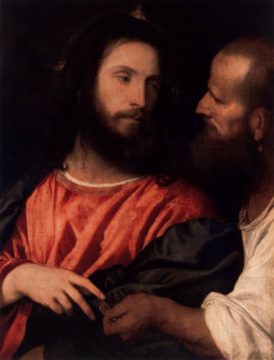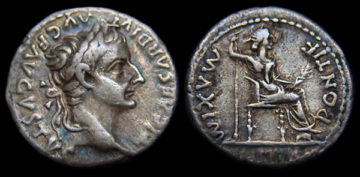Anticipating the Twenty-ninth Sunday of Ordinary Time, Fr. Paul Gallagher, OFM encourages us to reflect on God’s word. The content is edited by Franciscan Sister of Christian Charity Sister Anne Marie Lom and Joe Thiel. The excerpts from the Sunday readings are prepared by Joe Thiel. To read or download the complete pdf with excerpts for your prayer, please click here Franciscan Gospel Reflection October 18 2020. Excerpts are from the Lectionary for Mass for Use in the Dioceses of the United States of America, second typical edition © 2001, 1998, 1997, 1986, 1970 Confraternity of Christian Doctrine, Inc., Washington, DC. Used with permission. All rights reserved. No portion of this text may be reproduced by any means without permission in writing from the copyright owner. Photos: By DrusMAX – Self-photographed, CC BY-SA 3.0, https://commons.wikimedia.org/w/index.php?curid=24408884; By Titian – The Yorck Project (2002) 10.000 Meisterwerke der Malerei (DVD-ROM), distributed by DIRECTMEDIA Publishing GmbH. ISBN: 3936122202.Web Gallery of Art: Image Info about artwork, Public Domain, https://commons.wikimedia.org/w/index.php?curid=159487
Matthew 22:15-21
The Pharisees went off and plotted how they might entrap Jesus in speech. They sent their disciples to him, with the Herodians, saying, “Teacher, we know that you are a truthful man and that you teach the way of God in accordance with the truth. And you are not concerned with anyone’s opinion, for you do not regard a person’s status. Tell us, then, what is your opinion: Is it lawful to pay the census tax to Caesar or not?” Knowing their malice, Jesus said, “Why are you testing me, you hypocrites? Show me the coin that pays the census tax.” Then they handed him the Roman coin. He said to them, “Whose image is this and whose inscription?” They replied, “Caesar’s.” At that he said to them, “Then repay to Caesar what belongs to Caesar and to God what belongs to God.”
Background:
In the gospels for the last thee Sundays, Jesus has addressed the chief priests and the elders of the people with a parable. Three weeks ago, Jesus told the parable of a father who told his two sons to go and work in the vineyard. Two weeks ago, it was the parable of a landowner who had built a vineyard and send his messengers to collect his share of the harvest. Last week, Jesus again addressed the chief priests and the leaders with the parable of the father who prepares a great wedding banquet for his son but the invited guests refuse to come, and one who does come is not properly attired. All three of the parables contain a criticism of the leaders as failing to be authentic leaders.
In the gospel text for this Sunday, Matthew presents the kind of opposition that Jesus encountered from the religious leaders of his day. Given that Jesus has been critical of religious leadership of the day, it comes as no surprise that he is now challenged by them. But it is not the chief priests but rather the Pharisees and the Herodians who approach Jesus with a question that they hope will damage his credibility. The Pharisees as a group were tolerant of Roman rule but would have rejected any claim of Caesar’s divinity. The Herodians would have been supportive of Roman rule, at least as a way to preserve peace. These two groups did not normally have common interests. But here they came together to trap Jesus with their questions.
In response to their questions, Jesus asks them to show him the coin used to pay the temple tax. At this time, the coin was inscribed with the image of emperor Tiberius, and the inscription “Tiberius Caesar, Augustus, son of the divine Augustus, high priest.” To have such a coin would have been an embarrassment to the Pharisees. Even if it was one of the Herodians who actually produced the coin, the fact that it reveals that the Pharisees have joined forces with them to try to entrap Jesus would have been humiliating.
Reflection Questions:
- How does living in the weeks before a presidential election affect your ability to hear a gospel that contains some political argument?
- Have there been times in your life when you took a public stand for or against a position? What was it about that situation that was compelling you to take a stand?
- In the gospel, those who approach Jesus compliment him for being a person who is not concerned with anyone’s opinion. Where in the gospels do you see examples of Jesus not being concerned with the opinions of others? Where is he a person who is very much concerned with the opinions of others?
- They also say of him that he is not concerned with a person’s status. Where in the gospels do you find examples of Jesus’ disregard of a person’s status? Are there also places where he seems to be very concerned about the status of others?
- Jesus says, in verse , to give to Caesar what belongs to Caesar and to God what belongs to God. What is it that does not belong to God?
- Can you take some time to talk with God about your desire to be a person of peace and respect and a person who is committed to justice and respect for creation, or how the opinions of others affect what you say or don’t say?



